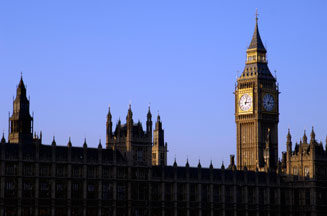
Public disaffection with the political process has transformed into outright rage in recent weeks following the scandal surrounding MPs' expenses. This will make it even more difficult to drive people to the ballot box, let alone persuade them to vote for any of the three main political parties.
Nonetheless, the Electoral Commission is running an ad campaign to encourage people to register to vote in next month's European and local elections. TV and press ads, which depict an invisible barrier that prevents people from voting, give information on how to register.
The campaign launched before the scandal broke, and its humorous tone now seems somewhat incongruous. The recession-battered UK public has been incensed by stories of how, as taxpayers, they have ultimately funded MPs' moat-cleaning, trouser press purchases, and mock-Tudor beam installations. It will, then, take a mammoth effort to re-engage the nation.
Nicola Mendelsohn, chairman of Karmarama, believes a change of emphasis is needed. 'It's not about getting people out to vote, but understanding the importance of voting,' she says.
A prominent Labour supporter, Mendelsohn adds that the workings of Brussels seems distant to voters in the UK. She calls for activity that communicates how life would change if the European Parliament did not exist.
Tim Duffy, chief executive of M&C Saatchi, which has previously held the Conservative Party's ad business, agrees with Mendelsohn. 'The public needs to better under-stand how European politics relates to climate change, employment and economic revival,' he says.
The election season has already begun. Direct-mail drops are appearing in letter boxes, and foot-soldiers are mustering for street action. Gordon Brown launched Labour's campaign last week. It focuses on the British route out of the recession. One execution takes a negative slant, showing a 'Tory boy' hitting a punchbag, interspersed with clips of people describing what life would be like under a Conservative government.
Meanwhile, Conservative leader David Cameron has continued with his Obama-inspired 'change' rhetoric. Digital activity on social networking sites and the Tory website is also planned.
Both Brown and Cameron have offered fulsome apologies for the expenses fiasco. However, the latter's 'Mr Angry' stance, which he has adopted before and is said to resonate well with voters, seems to have stolen the initiative from Brown.
'The only person who has come out of this well is David Cameron,' says Sacha Deshmukh, chief executive of Mandate Communications, the public affairs arm of Engine Group. 'The level of public anger is massive. Every minute is hurting parliament and parliamentarians.'
Over the past week, responses from MPs have morphed from bland statements that they 'acted within the rules' to publicly brandishing 'payback' cheques made out to the Fees Office, in an attempt to win public forgiveness.
It may now be doubly important that they do so, as, according to Alyson Stewart-Allen, chief executive of International Marketing Partners, the emphasis in political advertising has moved from the party's brand to that of individual politicians. 'The electorate now cares more about the moral compasses of the candidates than party affiliation,' she explains.
After the European and local elections are out of the way, the next contest on the horizon is the general election; next May is the most likely poll date. A week is a long time in politics, so the saying goes, but it could also be a very long year for Westminster as it seeks to rebuild its brand.


